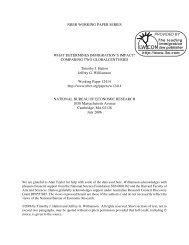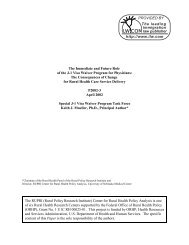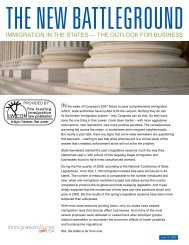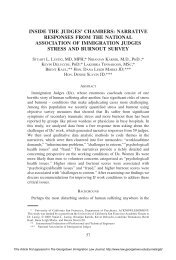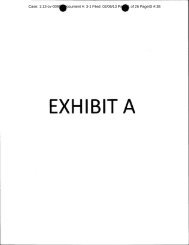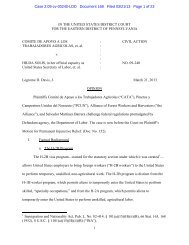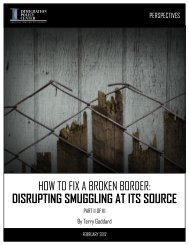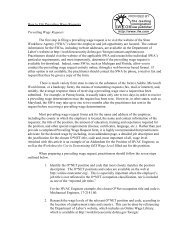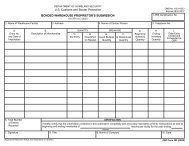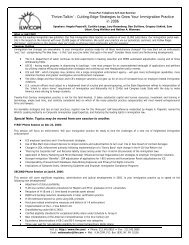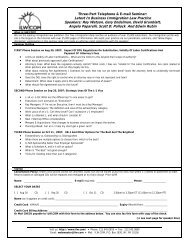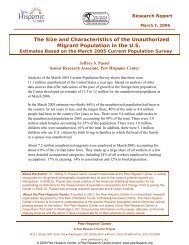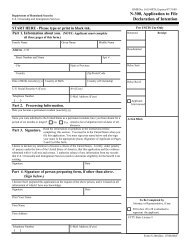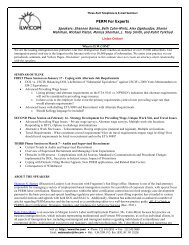Study of Board of Immigration Appeals Procedural Reforms - ILW.com
Study of Board of Immigration Appeals Procedural Reforms - ILW.com
Study of Board of Immigration Appeals Procedural Reforms - ILW.com
Create successful ePaper yourself
Turn your PDF publications into a flip-book with our unique Google optimized e-Paper software.
<strong>of</strong> free Westlaw time we received for this study from West, a Thomson business. We also<br />
reviewed internal memoranda produced pursuant to our requests under the Freedom <strong>of</strong><br />
Information Act. Several <strong>of</strong> those documents, or the data derived from them, are attached to this<br />
<strong>Study</strong> as appendices.<br />
Near the end <strong>of</strong> this <strong>Study</strong>, we highlight five individual cases illustrating the problems<br />
created by too-rapid BIA “affirmances without opinion,” which are now encouraged or required<br />
by the “<strong>Procedural</strong> <strong>Reforms</strong>.” In each case, a non-citizen was ordered expelled from the United<br />
States by an <strong>Immigration</strong> Judge, who made a patently obvious mistake. The BIA failed to catch<br />
and correct the mistakes; instead, in each case, the BIA summarily affirmed the erroneous<br />
decision without opinion or explanation. The non-citizens appealed the BIA summary<br />
affirmances to the federal circuit courts. The federal circuit courts dug back to the <strong>Immigration</strong><br />
Judge opinions, saw the obvious errors, reversed, and remanded back to the BIA to do “what the<br />
BIA should have done” in the first place:<br />
• Yong Tang, a leader <strong>of</strong> the Tiananmen Square protest beaten senseless during<br />
interrogations by Chinese police before he fled to the United States, was<br />
ordered expelled because an <strong>Immigration</strong> Judge did not believe his testimony<br />
“in a few respects.” Also, the <strong>Immigration</strong> Judge concluded, because Mr.<br />
Tang was working in the United States for a <strong>com</strong>pany run by persons <strong>of</strong><br />
Chinese extraction, he would not reasonably fear persecution upon his return<br />
to China. The entire basis <strong>of</strong> this remarkable conclusion, the <strong>Immigration</strong><br />
Judge admitted, was “a feeling.” The BIA summarily affirmed and never<br />
issued a written opinion. The United States Court <strong>of</strong> <strong>Appeals</strong> for the Third<br />
Circuit had to review the original <strong>Immigration</strong> Judge’s opinion “as though it<br />
were that <strong>of</strong> the BIA.” The Third Circuit reversed and remanded, finding the<br />
<strong>Immigration</strong> Judge’s decision to be based on “inferences, assumptions, and<br />
feelings that range from overreaching to sheer speculation.” 1<br />
• Azim Tuhin, a political activist, fled his native Bangladesh after being beaten<br />
many times by the police. He was ordered expelled because, according to the<br />
<strong>Immigration</strong> Judge, he had fled “prosecution, not persecution.” The BIA<br />
summarily affirmed. The United States Court <strong>of</strong> <strong>Appeals</strong> for the Seventh<br />
Circuit reversed and remanded, noting that the <strong>Immigration</strong> Judge never even<br />
mentioned Tuhin’s multiple beatings, and concluding that the <strong>Immigration</strong><br />
Judge’s view that prosecution and persecution are mutually exclusive “seems<br />
to be based on a fundamental misunderstanding <strong>of</strong> the law.” 2<br />
• Diland Herbert, a citizen <strong>of</strong> Trinidad and Tobago, was ordered expelled by an<br />
<strong>Immigration</strong> Judge who proceeded in absentia, even though Herbert’s lawyer<br />
had filed a motion for continuance, even though Herbert’s family was present,<br />
and even though Herbert was on the way (delayed by traffic in a heavy<br />
rainstorm). The BIA summarily affirmed. The United States Court <strong>of</strong> <strong>Appeals</strong><br />
for the First Circuit reversed and remanded, finding that proceeding in<br />
1 See Tang v. Ashcr<strong>of</strong>t, 2003 WL 1860549 (3d Cir. April 4, 2003) (unpublished opinion).<br />
2 See Tuhin v. Ashcr<strong>of</strong>t, 2003 WL 1342995 (7th Cir. Feb. 11, 2003) (unpublished opinion).<br />
6



